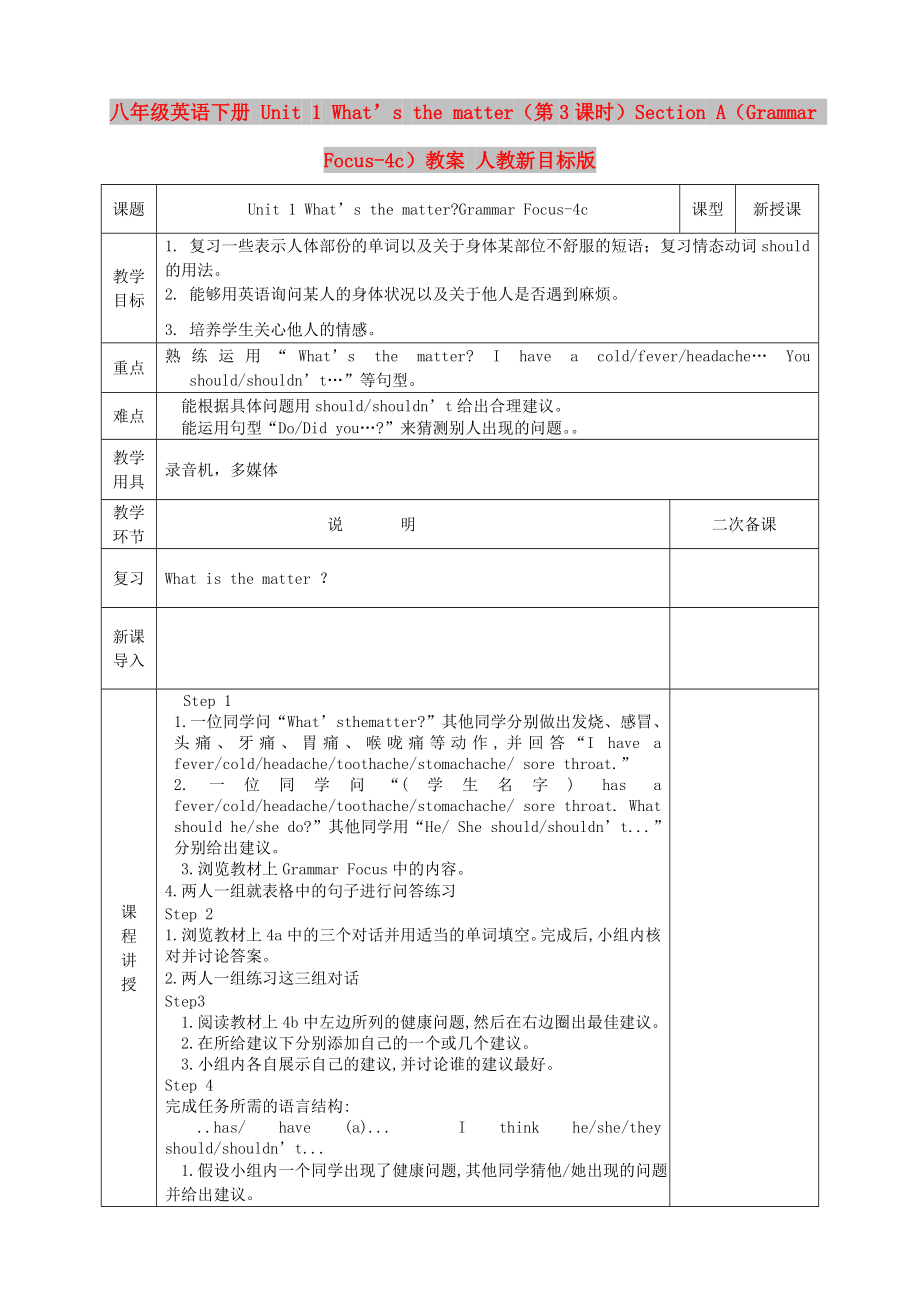《八年級英語下冊 Unit 1 What’s the matter(第3課時(shí))Section A(Grammar Focus-4c)教案 人教新目標(biāo)版》由會員分享��,可在線閱讀��,更多相關(guān)《八年級英語下冊 Unit 1 What’s the matter(第3課時(shí))Section A(Grammar Focus-4c)教案 人教新目標(biāo)版(3頁珍藏版)》請?jiān)谘b配圖網(wǎng)上搜索��。
1��、八年級英語下冊 Unit 1 What’s the matter(第3課時(shí))Section A(Grammar Focus-4c)教案 人教新目標(biāo)版
課題
Unit 1 What’s the matter?Grammar Focus-4c
課型
新授課
教學(xué)目標(biāo)
1. 復(fù)習(xí)一些表示人體部份的單詞以及關(guān)于身體某部位不舒服的短語��;復(fù)習(xí)情態(tài)動(dòng)詞should的用法��。
2. 能夠用英語詢問某人的身體狀況以及關(guān)于他人是否遇到麻煩��。
3. 培養(yǎng)學(xué)生關(guān)心他人的情感��。
重點(diǎn)
熟練運(yùn)用“What’s the matter? I have a cold/fever/headache… You s
2��、hould/shouldn’t…”等句型��。
難點(diǎn)
能根據(jù)具體問題用should/shouldn’t給出合理建議��。
能運(yùn)用句型“Do/Did you…?”來猜測別人出現(xiàn)的問題��。��。
教學(xué)用具
錄音機(jī)��,多媒體
教學(xué)環(huán)節(jié)
說 明
二次備課
復(fù)習(xí)
What is the matter ��?
新課導(dǎo)入
課 程 講 授
Step 1
1.一位同學(xué)問“What’s the matter?” 其他同學(xué)分別做出發(fā)燒��、感冒��、頭痛��、牙痛��、胃痛��、喉嚨痛等動(dòng)作,并回答“I have a fever/cold/headache/toothach
3��、e/stomachache/ sore throat.”
2.一位同學(xué)問“(學(xué)生名字) has a fever/cold/headache/toothache/stomachache/ sore throat. What should he/she do?”其他同學(xué)用“He/ She should/shouldn’t...”分別給出建議��。
3.瀏覽教材上Grammar Focus中的內(nèi)容��。
4.兩人一組就表格中的句子進(jìn)行問答練習(xí)
Step 2
1.瀏覽教材上4a中的三個(gè)對話并用適當(dāng)?shù)膯卧~填空��。完成后,小組內(nèi)核對并討論答案��。
2.兩人一組練習(xí)這三組對話
Step3
1.閱讀教材上
4、4b中左邊所列的健康問題,然后在右邊圈出最佳建議��。
2.在所給建議下分別添加自己的一個(gè)或幾個(gè)建議��。
3.小組內(nèi)各自展示自己的建議,并討論誰的建議最好��。
Step 4
完成任務(wù)所需的語言結(jié)構(gòu):
..has/ have (a)... I think he/she/they should/shouldn’t...
1.假設(shè)小組內(nèi)一個(gè)同學(xué)出現(xiàn)了健康問題,其他同學(xué)猜他/她出現(xiàn)的問題并給出建議��。
完成任務(wù)所需的語言結(jié)構(gòu):
A:What’s the matter? Did you hurt yourself when you played soccer?
5��、B:No, I didn’t.
C:Did you fall down?
B:Yes, I did.
D:You should go home and have a rest.
...
2.根據(jù)問答內(nèi)容,填寫下面的表格��。
Name
Problem
Advice
Liu Peng
fall down
go home and rest
Jenny cut herself.
herself為反身代詞,意為“她自己”��。反身代詞是表示反射或強(qiáng)調(diào)的代詞��。由第一人稱��、第二人稱形容詞性物主代詞或第三人稱代詞賓格形式,詞尾加-se
6��、lf或-selves組成��。反身代詞可以譯為“本人;本身”,為加強(qiáng)語氣,也常譯為“親自;自己”��。詳見下表:
數(shù)/人稱
第一人稱
第二人稱
第三人稱
單數(shù)
myself
ourself
himself/herself/itself
復(fù)數(shù)
ourselves
yourselves
themselves
反身代詞在句中可作賓語��、主語或賓語的同位語��、表語��。例如:
The child can dress himself. (作賓語)
Mr. Black himself is a doctor. (作主語的同位語)
You’d better ask Mar
7��、y herself. (作賓語的同位語)
Just be yourself. (作表語)
反身代詞的常用詞組:
teach oneself (自學(xué)), learn by oneself(自學(xué)), enjoy oneself (過得愉快), hurt oneself (受傷), help oneself to (隨便吃/用), by oneself (獨(dú)自)
小結(jié)
做一做:按要求完成下列各題��。
一��、用單詞的適當(dāng)形式填空��。
1.Can your little brother look after (he)??
2.The childre
8��、n made model planes (they).?
二��、單項(xiàng)選擇��。
( )—I will have a tennis game tomorrow. I’m a little bit nervous.
—Believe in . You’re the best in our club.?
A.herself B.myself C.yourself D.himself
作業(yè)布置
選一選
1.The doctor asked me to get (a; an) X-ray.?
2.Sam (have; has) a sore back.?
3.The girl fell down and hurt (her; herself).?
4.—What’s the matter (with; for) Lucy??
—She has a cough.
5.He should (lie; lies) down to have a good rest.?
板書設(shè)計(jì)
課后反思
 八年級英語下冊 Unit 1 What’s the matter(第3課時(shí))Section A(Grammar Focus-4c)教案 人教新目標(biāo)版
八年級英語下冊 Unit 1 What’s the matter(第3課時(shí))Section A(Grammar Focus-4c)教案 人教新目標(biāo)版

